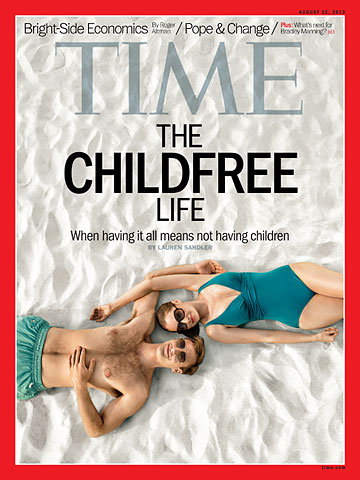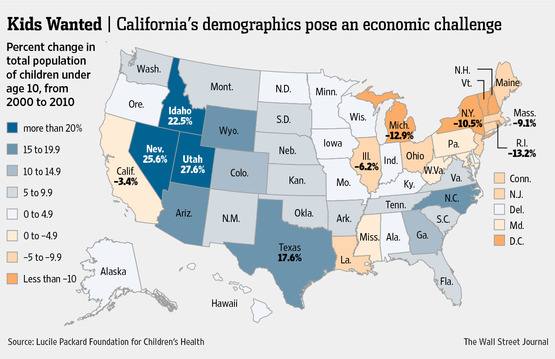The cause of intentional childlessness is going mainstream. Time magazine gave its cover to the cause with a lead story on the childfree life called The Childfree Life: When Having it all Means not Having Children. In that story, Lauren Sandler writes, "women who choose not to become mothers are finding new paths of acceptance. As their ranks rise, so do positive attitudes about leading a life in which having it all doesn't mean having a baby." The thrust of the article is a desire for the intentionally childfree (not to be confused with those who have been unable to conceive) to avoid any judgment for their choice and even to be celebrated.
 We should not be surprised to see bold advocacy for the childfree life in a culture that has come to prize the homosexual pattern of coupling with its intense emphasis on sexual expression, wink-wink attitude toward monogamy and disconnection between intimacy and reproduction. We should expect in a culture that values autonomy and sexual expression above all, a moral revolution in which the childfree are initially addressed as moral outliers, then elevated to victims of cruel judgment, then promoted to a place of moral enlightenment, while any who would esteem having children as an integral aspect of human flourishing are increasingly deemed morally backward. We should expect this among those who breathe the air of daily life in contemporary Western civilization. The preoccupation with sex as the highest good leaves little vision for the sacrifices required by the children that sex might produce.
We should not be surprised to see bold advocacy for the childfree life in a culture that has come to prize the homosexual pattern of coupling with its intense emphasis on sexual expression, wink-wink attitude toward monogamy and disconnection between intimacy and reproduction. We should expect in a culture that values autonomy and sexual expression above all, a moral revolution in which the childfree are initially addressed as moral outliers, then elevated to victims of cruel judgment, then promoted to a place of moral enlightenment, while any who would esteem having children as an integral aspect of human flourishing are increasingly deemed morally backward. We should expect this among those who breathe the air of daily life in contemporary Western civilization. The preoccupation with sex as the highest good leaves little vision for the sacrifices required by the children that sex might produce.
But we should also increasingly expect to see this in our churches. Even though Jonathan V. Last, Mary Eberstadt, and others have been explaining that churches are among the last communities who value children as part of a life with a cause bigger than themselves, we increasingly see church attendees who believe instead that the church should be more like the world around it.
A good example is a recent post by Relevant magazine, Why I Decided to Not Have Kids. This post, as well as the comments that follow an article Kathleen Neilsen wrote for The Gospel Coalition (The Problem with the Childfree Life), give us an indication for how the childfree aspiration is showing up in the church. Are we ready with the hope of Christ for Christians considering childlessness?
Are we ready first with accurate information?
JaJa Yang, author of the Relevant article raises an alarm about overpopulation. "...we have filled the earth to the tune of 7.1 billion people and one birth every 8 seconds," she says, adding: "(I am watching the world population clock ticking away as I write)." We have been hearing warnings of overpopulation since 1968 when Paul Ehrlich wrote The Population Bomb and prophesied that growing population would outrun available resources and threaten the survival of mankind. The gross inaccuracy about population growth has been the assumption that the problem comes down to so many people having so many babies. The reality is that most of the world population growth has been tied to health advances that extend life, not to a spike in more planned births. As demographer Nicolas Eberstadt explains, "it's not that people have been multiplying like rabbits, it's that they stopped dying like flies." Even the United Nations and numerous countries that believed Paul Ehrlich's warnings and then implemented radical efforts to cut birth rates are now reversing course and warning of the population implosion that is occurring as the childfree vision is taking root and countries with expanding elderly populations face dismally low new birth rates.
Are we ready with good theology vs. a "Precious Moments" religion?
Our churches and even pro-family organizations often have little to offer those who ask the question, "Why have children?" In part, this is because people over 50 rarely heard that they needed solid answers to that question before becoming parents. Today, singles and couples are warned to think long and hard about the world they would bring children into, are counseled to count every penny those children would cost and are prodded to take on the venture only once they have compelling reasons to do so. When they ask their parents, "So, why should we have kids?' they often get blank stares from parents who never wrestled with such a question or at times will cause their parents to doubt their own course and to wonder if maybe they should have waited on kids or avoided having children themselves.
What won't serve skeptical singles and couples is a "Precious Moments" religion that simply dotes on the blessings of children ("You'll just love their first smile" "There's nothing like unconditional love of a baby," etc.). Sentimentality about babies and childhood only goes so far in the face of the counterevidence mounting in the trial against parenthood. As my wife and I wrote in our book Start Your Family,"the realist will tell you that for every precious moment comes hours of toil. The consumer in you will remember that a lot of those superficial joys can be had, or nearly so, with the swipe of your credit card. Alternatives abound promising instant gratification and generous return policies."
Those who have received the Spirit of God should have answers that are compellingly distinct from those who are limited to the spirit of the world. Our answers must be marked by:
1) a reverence for a God who created us with the miraculous ability to create new life from sexual union
2) a trust in His revealed Word that is filled start to finish with an expectation of fruitfulness that will spread His glory to the ends of the earth--a vision of fruitfulness that clearly grows from a biological context to a spiritual context, but continues to stand in bold contrast to a consumeristic culture that rejects both biological and spiritual fruitfulness
3) a theology of sanctification that doesn't whitewash the sacrifices children require, but demonstrates the kindness of God in making one of the primary means of our sanctification also one of the greatest means of our blessing
4) a compassion for those who have been unable to have children, who worry that past abuse will make them poor parents, or who feel overwhelmed by debt and other financial obstacles to starting a family--but a compassion that points to the hope of Christ and not identity politics or other hopeless cultural grievances
5) and a life that incarnationally bears the fruit of the Spirit and demonstrates loving marriages that spill over into new life, a commitment to not only bear new life, but to bear the responsibility to discipline and disciple that life as unto the Lord.
The child free moment is here, are you ready with the hope of a God who is faithful to all generations?







